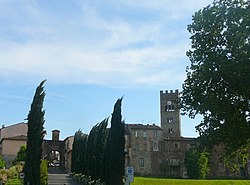Altopascio
| Altopascio | |
|---|---|
| Comune | |

Church of San Jacopo Maggiore.
|
|
| Location of Altopascio in Italy | |
| Coordinates: 43°49′N 10°41′E / 43.817°N 10.683°E | |
| Country | Italy |
| Province / Metropolitan city | Lucca (LU) |
| Frazioni | Badia Pozzeveri, Marginone, Spianate |
| Government | |
| • Mayor | Sara D'Ambrosio |
| Area | |
| • Total | 28 km2 (11 sq mi) |
| Elevation | 19 m (62 ft) |
| Population (1 January 2016) | |
| • Total | 15,481 |
| • Density | 550/km2 (1,400/sq mi) |
| Demonym(s) | Altopascesi |
| Time zone | CET (UTC+1) |
| • Summer (DST) | CEST (UTC+2) |
| Postal code | 55011 |
| Dialing code | 0583 |
| Patron saint | St. Jacopo |
| Saint day | July 25 |
Altopascio is a comune in the Province of Lucca in the Tuscany region of Italy with a population of 15,481.
Already inhabited in Roman times, Altopascio gained in importance due to its Spedale (hostel, first mentioned in 1084) for the pilgrims who travelled on the Via Francigena, leading from France to Rome. This formed the basis of the later Order of Saint James of Altopascio. This, founded by Matilda of Canossa between 1070 and 1080, was one of the first of the Military Orders; it existed for four hundred years, in which it had considerable social, political and military influence, and though gaining land in various European countries retained its strong ties to the town where it was founded.
It is famous for the battle of Altopascio in 1325 in which the Ghibelline leader Castruccio Castracani defeated the Florentines Guelphs led by Ramon de Cardona. Thanks to his victory, he became duke of Lucca.
The Spedale declined starting from the 16th century, until Grand Duke Peter Leopold suppressed it in 1773, to favour that in Pescia.
...
Wikipedia

